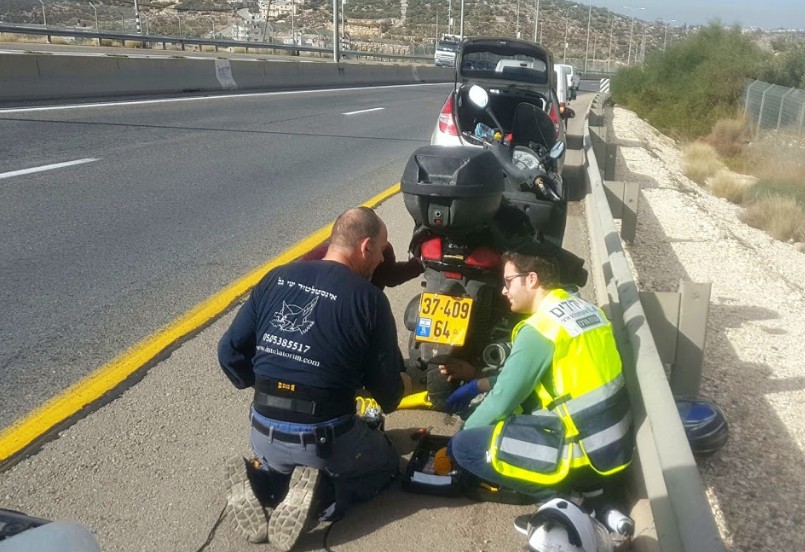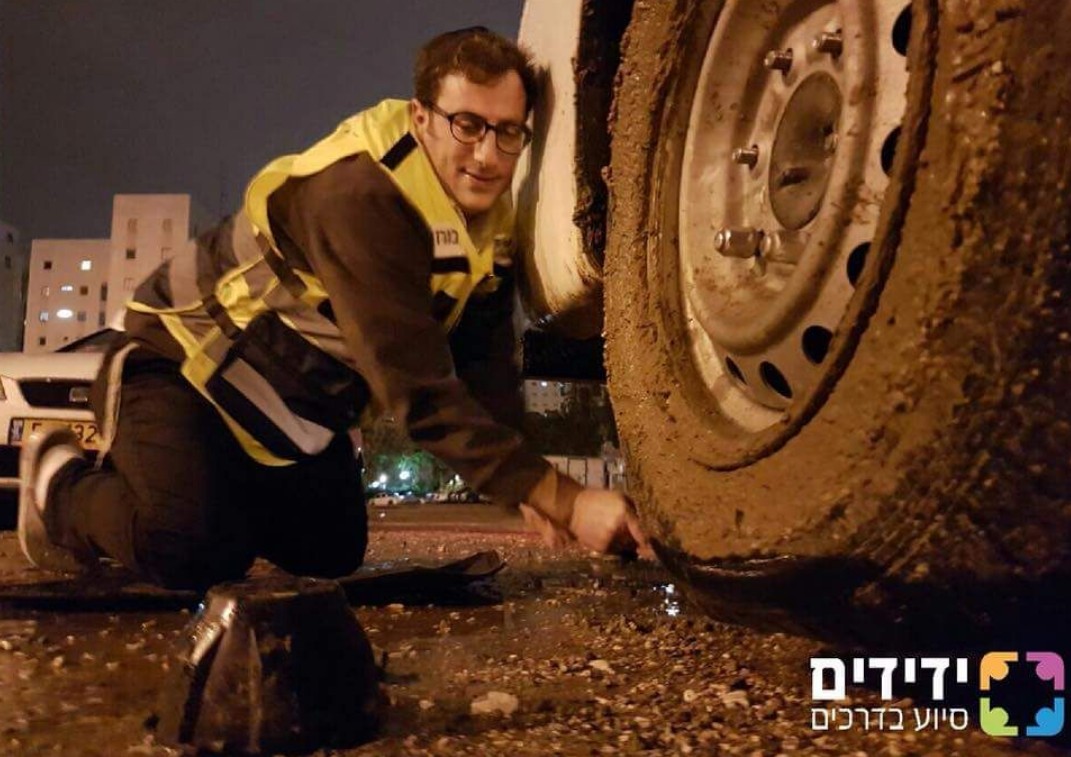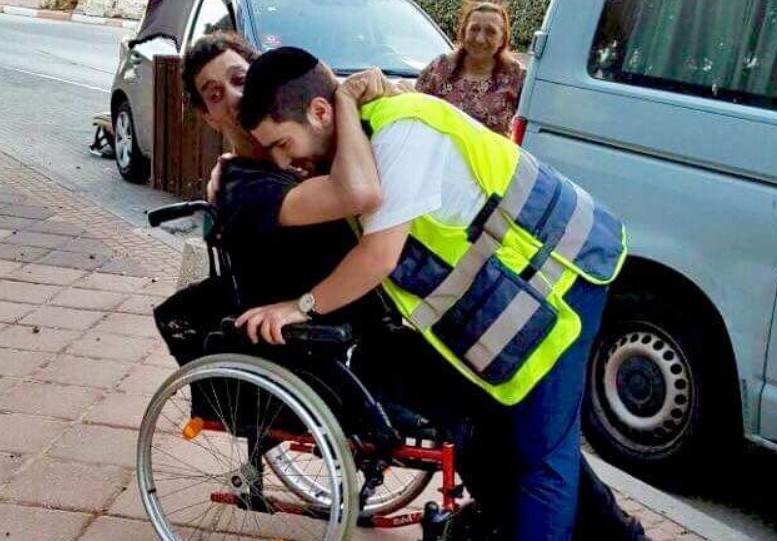"No One Stopped for Me on the Road. I Told Myself 'This Can't Be': An Interview with Yedidim CEO
Need assistance? The number is inside. Today, Yedidim doesn't just help people with flat tires, they also rescue children from locked cars, jump-start vehicles, free trapped individuals from elevators, and help anyone in need. And CEO Israel Elmasi, who recruited 7,000 new volunteers in the past year? He's also a senior manager at a credit company. A heartwarming interview.
 Israel Elmasi (Photo: Yaakov Baged)
Israel Elmasi (Photo: Yaakov Baged)Ten minutes into my conversation with Israel Elmasi, Yedidim's CEO, he received a message that another child had passed away due to being forgotten in a car. This time it happened in the settlement of Rechasim in the north. His bright face changed sharply before me. After a few moments of introspection, he said he could no longer bear these tragedies. He dedicates his best time and effort to this, but it never stops. And each case reminds him of the harsh sights he encountered one afternoon that began as a regular day on a street in Ramat Gan.
"I will never forget that day," says Elmasi. "I was in the Ramat Gan area, and suddenly I received a call reporting a baby trapped in a car. The moment I saw the location, I realized I was a minute away, so I rushed there. Unfortunately, we all arrived too late. The baby had died. The sights were unbearable."
The fascinating and personal conversation with Elmasi about rescuing children can easily continue for a long time, but it is appropriate to begin with a few words about the founding and operation of the Yedidim organization. "Twelve years ago, at the end of the Second Intifada," notes Elmasi, "Meir Winer founded Yedidim. Winer, who had a store near Highway 443, which was plagued by terrorist attacks, created a communication network based on MIRS devices to assist victims of attacks in the area.
"At that time, traveling on Highway 443 was very dangerous, and there was a clear need to evacuate the wounded as quickly as possible. In those days, MIRS devices were the hot thing, and Meir sent messages about attacks to all his friends in the network. It's hard to believe, but back then there was no WhatsApp. As technology advanced, the MIRS era ended, and the organization faded away with it."
Volunteers in Action:
Okay. When and how did you get involved?
"Six years ago, I left home as usual at 5 in the morning, and my car wouldn't start. For an hour and fifteen minutes, I stood in the heart of Bnei Brak, outside my car, in pouring rain, holding cables, signaling to passing cars to stop and help me jump-start, yet no one stopped. During those moments, I said to myself: 'This can't be.' How can a person be stuck like this for so long, and no one helps? I knew and felt there must be good people who would want to help. "
"So, the first thing I did was to set up a WhatsApp group called 'Cables.' I'm talking about the very early days of WhatsApp. In each group, you could enter a maximum of 20 people. Then I heard about Yedidim through a mutual friend. Within minutes, I called Meir and told him about my ideas for mutual help. Meir wanted me to take over the organization. Completely. From A to Z. But I didn't want that. I just wanted to develop it."
"So that's what I did. I started from scratch but within the existing framework. At that time, the organization had nothing. In fact, what I did was transition the organization from MIRS to WhatsApp. I just opened WhatsApp groups everywhere. Groups of good people who wanted to help others. Initially, people laughed at me. They said, 'Yedidim—they'll tie your shoelaces when they open.' But I was determined to reach a state where there would not be a single person in trouble without help."

7,000 New Volunteers in the Last YearThe idea behind the organization is so fundamental and essential, yet also wonderful and touching—mutual assistance and compassion for anyone in need. This goes beyond differences in religion, race, and gender. What is particularly interesting to discuss is the expansion of the organization, which in the last year alone recruited about 7,000 additional volunteers—a remarkable number, to say the least.
How do you explain the significant growth in the number of the organization's volunteers?
"First of all, it must be said that everything is with great ayuda from Hashem. Beyond that, many people connect with the idea, and indeed in the last year, 7,000 people joined the organization. Every day, in fact, 30 new volunteers join. The organization is serious and organized; for example, there is insurance for all volunteers who go out to the field, and people understand this. Additionally, the Jewish people have a great desire to help."
How does the phone center work where calls for assistance come in?
"Any volunteer can dial a certain number, and from that moment on, they begin receiving calls that come to the center. So many people want to be at the center, 24/6 around the clock, that it has become complicated to receive a call. They snap it up immediately. Furthermore, every region has a center manager, shift managers, etc. Perhaps this is the place to mention that all the people associated with the organization do this as full volunteers. And it never ceases to excite and amaze me."
How is it actually possible to operate an organization composed solely of volunteers?
"At first glance, it seems almost impossible, but here it happens. I also work full-time as a project manager in one of the largest credit companies in the market, but I try very much to assist this great and good thing. The people of Israel are merciful and do chesed."
What happens after a request for assistance is received at the center?
"In the first stage, the operator tries to assist over the phone, but if that isn’t enough, they send the information about the request to a location-based WhatsApp group, according to where help was requested. Volunteers who can assist at that time contact the center and say they can help. Then the center sends those who said they could help precise details and the phone number of the caller, and they head out."

In the beginning, your main activity was assisting those stuck due to a flat tire. Which other areas have you entered in the last year?
"Today, the organization's volunteers handle a wide variety of issues. Among other things, it's helping people stuck with flat tires, people trapped in elevators, children locked in cars, and people whose cars won't start and need cables. In addition, the organization has a jeep unit that rescues people situated in difficult terrain, a missing persons unit, and a logistics unit that helps many in various ways and channels.
"One of the interesting things done by the logistics unit, which specializes in the rapid transportation of necessary things from place to place, happened one day when a truck hit a bridge on the Geha Highway, which collapsed as a result. This incident created huge traffic jams that lasted for many hours, and suddenly a request came in from a mother who was stuck in the traffic jam with her young baby.
The baby screamed for a long time due to hunger, but the mother did not have the amount of water required to prepare the baby’s food. Our volunteer went out to the field, riding a motorcycle, and located her car. He gave her everything needed to calm the baby, who had suffered a lot and perhaps was even beginning to fall into a dangerous situation."
What other interesting stories have occurred during the organization’s activity?
"Wow. There are endless stories like these. Not long ago, our volunteers helped start the car of Rabbi David Lau, the Chief Rabbi of Israel, when he and his entourage were leaving the Itzkowitz synagogue in Bnei Brak late at night. The Rabbi and his entourage discovered that their car wouldn’t start and immediately called us, asking for help.
"Truth be told, several interesting stories happen here every day. However, one of my favorites, which demonstrates the great kindness of the organization’s people, happened three months ago. It was Friday afternoon, and I received a call. Many times, people ask for the number of Yedidim and send them my private mobile instead of the center’s number.
"On the line was an Orthodox man from Bnei Brak who had traveled with his three daughters to Mount Hermon. During their ride on the cable car, their car key fell into the snow-covered mountains beneath them. There were no taxis in the area, nothing. He really asked for our help. Shabbat was a few hours away, and they were stuck, freezing, alone on Mount Hermon. We made a few calls, and shortly thereafter our branch manager in Tiberias sent him a taxi. When the father arrived with his daughters in Tiberias, a cabin awaited them, along with delicious food, in honor of the holy Shabbat."

A Million Events to Date
In the past year, the main efforts of Yedidim have focused on turning the organization into something advanced and technological. This started after a group of about 100 senior hi-tech people heard about Yedidim and decided to create an app for the organization voluntarily. "Something like this costs a quarter-million shekels," says Elmasi. "Additionally, for the first time, we provided an easy way for the deaf and mute to contact us. We created Yedidiah, a bot on our website and Facebook page, which people can chat with to submit requests easily and orderly."
How many of your volunteers are religious?
"A very high percentage of our volunteers are secular. Yet, everyone knows there is no activity on Shabbat even though we do so many things. We are not defined as an emergency organization, so we don’t operate on Shabbat. Again, regarding secular people, it's important for me to say that our ultimate goal is to create unity.
"In my view, the organization's purpose is not just to rescue people in trouble. Mostly, we strive to increase unity in the nation. To connect audiences. Our aspiration, with Hashem's help, is to reach half a million members in the organization. We want people to see the beautiful face of the Jewish people. We want to increase love for Israel."
How many people have you helped in the past year and overall so far?
"In 2017, we helped nearly 200,000 people. From the beginning of the organization's activity until today, we have participated in about one million events across the country. Now we are preparing to recruit another 1,500 volunteers by the summer vacation, which is a very busy period for us. By this, with Hashem's help, we will reach 10,000 volunteers."
What other paths do you want to explore?
"Recently, we began a collaboration with 'Maayan' high school in Petah Tikva. I don’t even know where to begin when I talk about how good this does for those who reach out, and even more so for the students themselves. A few days ago, I received a call from an unfamiliar number, and on the other end, was the father of one of the students participating in the project.
"He asked, 'Israel,' I answered, 'Yes,' then he said: 'I want to thank you.' For the next four full minutes, the man cried on the line. He couldn’t get a word out. After somehow finishing, he told me that since the child was born, they had never succeeded in giving him satisfaction. Nothing interested him or gave him meaning in life. But from the moment he connected with the organization - he started to live."
Now to another matter. The general public has been exposed to struggles between rescue organizations. Where are you in this story?
"We do not get involved in the wars of rescue organizations. I’ll tell you more – MDA people, ZAKA members, and volunteers from all other organizations volunteer with us. Generally, if one of our volunteers tries to stir up conflict between organizations, by sending notifications to the media, or anything like that, they are immediately removed from the organization. Our motto is to come quietly, do the job, and move on."
Israel Elmasi - Yedidim CEO honored by lighting a torch (Year 5780). Watch
And amid all this, what are your personal challenges in managing the organization?
"I vividly remember one time when our volunteer reached the site where a child was trapped in a car, but he didn’t have a break-in kit. The minutes that passed until another volunteer arrived were dangerous and nerve-wracking. My dream is for every volunteer to have a complete and quality equipment kit. Break-in kit, jump-start kit, hydraulic jack, and a tire repair kit."
Towards the end of our meeting, the issue of children trapped in cars comes up again. The approaching summer raises this issue time and again. "I don’t judge anyone," says Elmasi, "It could happen to anyone. It happened to one of my best friends. An incredible father. There are not many fathers like him.
"We are very close, and after it happened, I asked him how it happened to him. He replied that he simply had no idea. He took it very hard. I think the main thing is to really internalize this. For every parent to say it over and over again. Every day. Get used to glancing backward, even when driving alone. That it penetrates the bones. Yet, there’s no need to be angry with these parents. It's not for nothing that the state doesn’t punish them. They already got the harshest punishment they can get."
To join the volunteer network and for assistance requests - Phone Center: 0533131310

